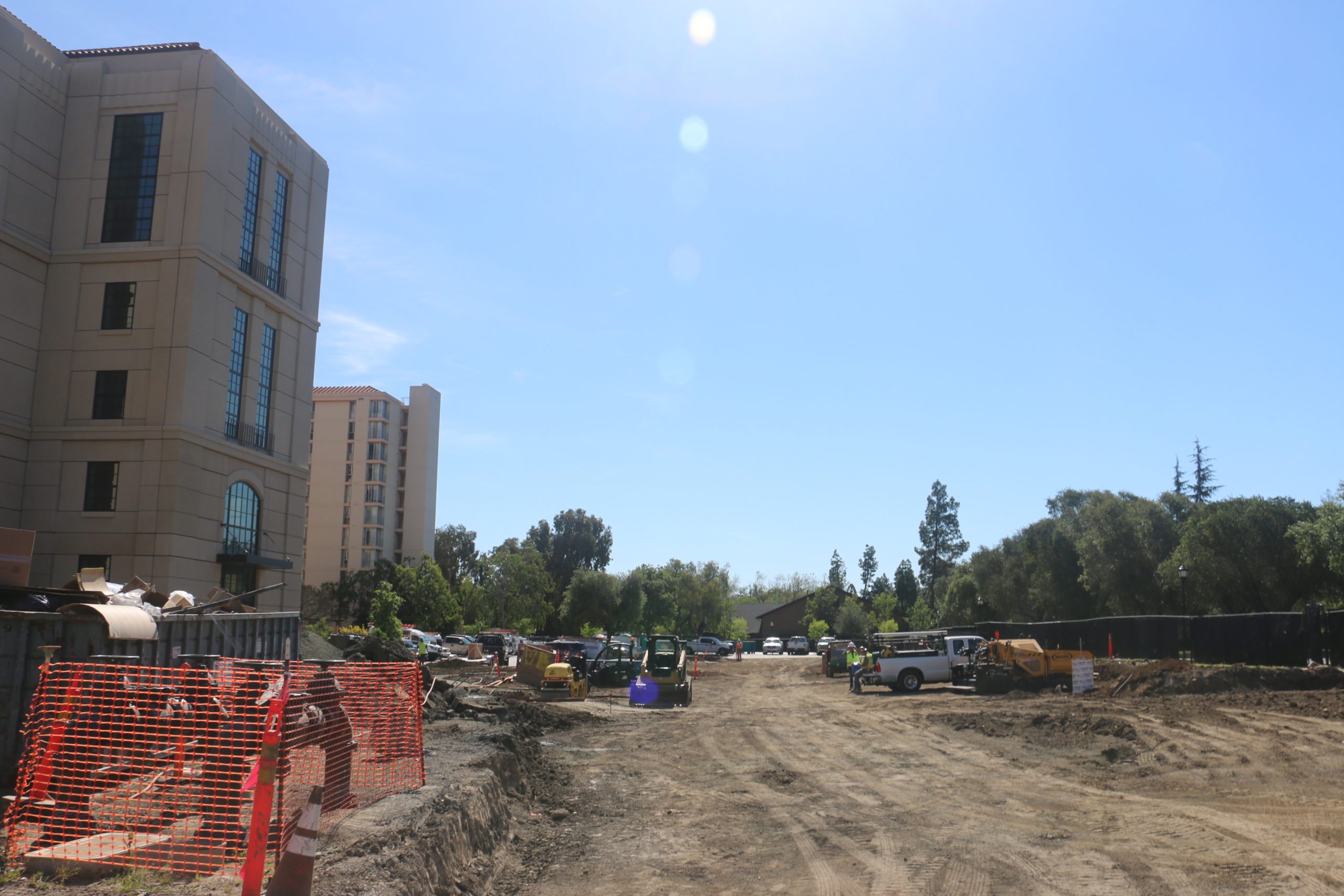Graduate students living near the Escondido Village Graduate Residences (EVGR) project say that EVGR construction noise, which began on May 4, has been extremely loud and in some cases surpassed 100 decibels (dB) — a level that could cause permanent hearing loss.
Residents of the McFarland house in Escondido Village reported indoor phone and computer decibel readings averaging above 100 dB and peaking at 110 dB. Exposure to an average of 100 dB for over 15 minutes can potentially cause permanent hearing loss, according to the Centers for Disease Control and Prevention (CDC). Students in the Escondido Village buildings Hoskins, Blackwelder and Quillen have also raised concerns about the noise levels.
“This whole week, I’ve had to yell over Zoom,” said one McFarland resident, who was granted anonymity due to fear of retaliation. “It’s hard enough to teach over Zoom, but now we have to yell over Zoom, and I can’t hear what my students are saying, and it just makes everything impossible.”
University spokesperson E.J. Miranda declined to confirm whether the students’ alleged noise measurements are accurate. Miranda wrote in a statement to The Daily that the University “recognizes that EVGR construction can be disruptive.”
“Noise and other impacts are carefully monitored and mitigated to the extent possible,” Miranda wrote.
The EVGR project, when completed, would help “provide subsidized housing for our graduate students so that they can live on campus and facilitate our critical educational and research mission,” Miranda added.
He wrote that Residential & Dining Enterprises (R&DE) and the Graduate Life Office (GLO) have also “frequently collaborated” with individual students to offer assistance like providing temporary or permanent relocations.
Students said the noise since construction resumed has been noticeably louder than noise during fall and winter quarters, and without the possibility of leaving their apartments for labs and libraries, they feel that such noise is unbearable. The noise is also expected to increase: R&DE sent a Friday email to McFarland and Hoskins students alerting them that they should “expect increased noise starting Tuesday, May 12, due to asphalt breakup and haul-away adjacent to your building.”
Abhinav Parakh, a third-year materials science Ph.D. student, said the noise was causing him to lose focus and experience repeated headaches.
“The shelter in place just made it a bit worse, with the noise and the dust,” Parakh said.
Students said that while the noise has reached a new peak, they have been registering noise complaints throughout the year. GLO has responded by offering to provide noise-canceling headphones and white-noise machines for the excessive noise and providing “relief spaces” where students can work. These spaces are limited due to social distancing.
However, students said no one has received any headsets because GLO has been either unresponsive or out of stock.
“In theory, the housing office offered us air purifiers and headphones, but again, they don’t respond to our emails when we request these things, so we haven’t gotten any of them,” said the McFarland resident.
Thus, students have resorted to their own measures, including wearing wax earplugs, using their own noise-canceling headphones and moving away from windows and doors.
“I used to study in the library when the library was open so that I wouldn’t need to hear the noise, but now I don’t think there’s been anything that’s been super effective,” said another McFarland resident, who was also granted anonymity due to fear of retaliation. They told The Daily that they have recorded noise levels of up to 109 dB.
Miranda told The Daily that students can pick up noise-reducing items from their R&DE student housing front desk. He wrote that the University is “not aware of an instance where a student request for these items was denied.”
Students said the University can take additional action, like providing students with stronger hearing protection equipment, lowering rent to reflect the reduced quality of housing provided, upgrading windows to make them more sound-proof or slowing construction because COVID-19 may not allow students to move back in fall.
Miranda declined to comment on these proposed solutions and wrote that R&DE has provided student accommodations like respite spaces on campus, away from the construction site, where students can study.
“Protecting the health and safety of construction workers and the university community is a critical concern for the university,” Miranda wrote.
Parakh said he wonders why construction is needed now.
“I don’t understand why can’t they [the University] do this particularly noisy work after the shelter in place is lifted for everyone,” Parakh said.
Contact Alexander Li at ali ‘at’ stanford.edu.
